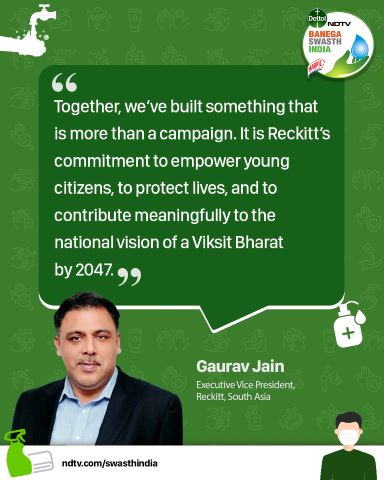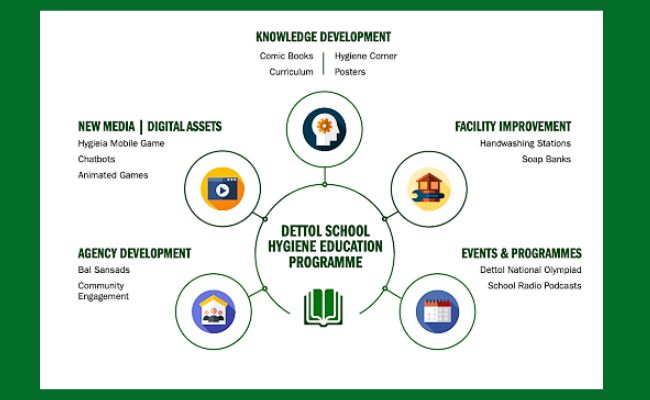New Delhi: Reckitt’s Dettol Banega Swasth India campaign marks a decade of impact, reaching more than 26 million children across 840,000 schools and driving a generational shift in hygiene behaviour till 2024. Launched in 2014, with NDTV as a long-standing partner, the initiative has grown into one of India’s longest-running public health movements. Central to its success is the Dettol School Hygiene Education Programme, which uses science-based learning, digital tools, and community engagement to promote hand hygiene as a lifelong habit. In 2024 alone, it enabled over 38 billion handwashing occasions, contributing to a 39 per cent drop in school absenteeism and a 95.1 per cent student happiness rate.
The programme’s peer-to-peer model, interactive curriculum, and innovations like AI-powered chatbots and gamified learning are designed to engage Gen Z and Gen Alpha. Its approach aligns with the UN Sustainable Development Goals and India’s vision of a Viksit Bharat by 2047.
With its global hygiene platform, One World Hygiene, Reckitt extends its mission beyond borders, promoting hand hygiene as a universal right and the first line of defence against rising health threats in an interconnected world.
Reflecting on the campaign’s mission, Gaurav Jain, Executive Vice President – South Asia, remarked,
We believe good health starts at home. With every action we take, we strive to make our consumers’ lives easier, cleaner and healthier, to strengthen communities and to create a more sustainable future.
He further said,
Speaking about the global perspective of the initiative, Ravi Bhatnagar, Communications and Corporate Affairs Director – South Asia, MENARP and Africa, Reckitt, said,
In an increasingly interconnected world, the importance of universal hygiene standards has never been more critical. One World Hygiene, a public health campaign spearheaded by Dettol, focuses on promoting health and hygiene—and on the importance of global unity and collaboration in achieving better hygiene practices for a healthier world.
He added,

Dettol Banega Swasth India – Programme Reach And Scale
Over the years, the impact of this programme is notable, showing a 39 per cent reduction in overall absenteeism among schools that participated in the annual school survey. Additionally, the programme’s social impact is substantial; for every Re 1 invested, it delivers Rs. 65 of social value.
Key Highlights:
- 26 million children reached since inception
- Active in 22 states
- 840,000 formal and 50,000 informal schools covered
- 38 billion handwashing occasions recorded in 2024 alone
- 39 per cent reduction in absenteeism reported
- 95.1 per cent of students reported feeling ‘Very Happy to Content’
Dettol School Hygiene Education Programme
Since its launch in 2014, the Dettol School Hygiene Education Programme has served as the cornerstone of the Dettol Banega Swasth India campaign, embedding hygiene education into schools to foster lifelong health behaviours.
Five Pillars Of The Programme
- Facility Improvement – Ensuring soap and water access at handwashing stations.
- Knowledge Development – Age-appropriate curriculum and hygiene education tools.
- Agency Development – Empowering students as hygiene ambassadors through Bal Sansads and community engagement.
- Events and Programmes – Teaching health and hygiene lessons through various programmes, such as, Dettol National Olympiad, School Radio Podcasts, etc.
- New Media & Digital Assets – Engaging students in health and hygiene awareness activities through Hygieia Mobile game, chatbots, and animation videos.
Knowledge-Attitude-Practice (KABP)
Reckitt’s commitment to hygiene is rooted in research and evidence. The KABP survey for 2024-25 evaluates the effectiveness of hygiene education among school children and reveals significant improvements in their knowledge and practices related to hand hygiene.
According to the 2024-25 KABP survey conducted among 10,410 students across 13 states, the programme has led to a remarkable shift in hygiene behaviour.
Reckitt’s commitment to hygiene is rooted in research and evidence. The KABP survey for 2024-25 evaluates the effectiveness of hygiene education among school children and reveals significant improvements in their knowledge and practices related to hand hygiene.
According to the 2024-25 KABP survey conducted across 5,179 schools in 13 states, the programme has led to a remarkable shift in hygiene behaviour.
Knowledge about hygiene improved from 35 per cent at baseline to 99.5 per cent, while positive attitudes rose from 24 per cent to 97.6 per cent. Observable hygienic behaviour increased from 16 per cent to 94.4 per cent, and actual hygienic practices jumped from 11 per cent to 85.6 per cent.
- Children with correct knowledge were 3.23x more likely to follow hand hygiene.
- Positive attitude led to a 2.76x higher likelihood of proper handwashing.
- Observed behaviour translated to a 2.51x increase in hygienic practice.
Tackling Health Issues: Diarrhoea, Fever, Worm Infections
Practicing good hand hygiene—particularly through regular handwashing—is one of the most effective and accessible ways to prevent the spread of infections, such as Diarrhoea, fever, and much more. According to the Dettol School Hygiene Education Programme Survey Findings, the top three reasons for students to be absent from school are Diarrhoea, Fever and Worms in stool.
But over the years, Dettol School Hygiene Education Programme has taken strides to reduce the number of children victim to this, and the result has shown. Diarrhoea, fever, and worms, the top causes of absenteeism, have seen a significant reduction. There was a 23.4 per cent rise in children’s knowledge of Diarrhoea prevention (95 per cent children by 2024). Additionally, there was 39 per cent of reduction in school absenteeism over time.
Digital Innovations: Technology, AI, And Gamification
To appeal to Gen Z and Gen Alpha learners, the programme leverages a variety of engaging, interactive tools that make hygiene education both accessible and enjoyable. These include animated videos, comic books, gamified learning modules, digital hygiene workbooks, interactive apps, and a chatbot that answers students’ hygiene-related questions in real time.
- Hygieia App: A 25-level Android game simulating germ transmission across environments.
- AI-powered WhatsApp Chatbot: Launched at WEF 2025 (Davos); supports 22 Indian languages and 3 global languages (Spanish, French, Mandarin).
- 91.4 per cent of students accessed hygiene videos via smartphones.
- Use of animation and digital learning tools increased from 5 per cent (2016) to 77 per cent (2024).
Learning Tools And Child Participation
The Dettol School Hygiene Education Programme delivers a comprehensive hygiene curriculum that covers personal care, hygiene at home and school, practices during illness, and environmental cleanliness. This content is made engaging through interactive tools such as workbooks, posters, comics like Chacha Chaudhary, STEM-based toolkits, games, and dedicated Hygiene Play Parks. Peer-to-peer learning is encouraged through student-led Bal Sansads (Children’s Parliaments), fostering collective responsibility and dialogue around hygiene. Over 95 per cent of trained teachers reported that the curriculum was both easy to implement and effective in driving student engagement and behaviour change.
Alignment With Global Goals
The campaign directly supports Sustainable Development Goal (SDG) 6.2.1, which focuses on achieving access to adequate and equitable sanitation and hygiene for all. By promoting universal hand hygiene practices—especially among schoolchildren—the programme plays a key role in driving safe sanitation, reducing disease burden, and fostering long-term behavioural change.
- As per the UN Secretary-General’s 2024 SDG Progress Report, 3.5 billion people still lack safely managed sanitation.
- Achieving universal hygiene will require a threefold increase in current global progress rates.
By combining education, innovation, and community engagement, Dettol Banega Swasth India is not just teaching children to wash their hands—it’s helping build a healthier, more resilient nation. As the programme continues to grow, its model serves as a blueprint for advancing preventive health and behavioural transformation, both in India and globally.
NDTV – Dettol have been working towards a clean and healthy India since 2014 via the Banega Swachh India initiative, which in its Season 10 is helmed by Campaign Ambassador Ayushmann Khurrana. The campaign aims to highlight the inter-dependency of humans and the environment, and of humans on one another with the focus on One Health, One Planet, One Future – Leaving No One Behind. It stresses on the need to take care of, and consider, everyone’s health in India – especially vulnerable communities – the LGBTQ population, indigenous people, India’s different tribes, ethnic and linguistic minorities, people with disabilities, migrants, geographically remote populations, gender and sexual minorities. In a world post COVID-19 pandemic, the need for WASH (Water, Sanitation and Hygiene) is reaffirmed as handwashing is one of the ways to prevent Coronavirus infection and other diseases. The campaign will continue to raise awareness on the same along with focussing on the importance of nutrition and healthcare for women and children, fight malnutrition, mental well-being, self-care, science and health, adolescent health & gender awareness. Along with the health of people, the campaign has realised the need to also take care of the health of the eco-system. Our environment is fragile due to human activity, which is not only over-exploiting available resources, but also generating immense pollution as a result of using and extracting those resources. The imbalance has also led to immense biodiversity loss that has caused one of the biggest threats to human survival – climate change. It has now been described as a “code red for humanity.” The campaign will continue to cover issues like air pollution, waste management, plastic ban, manual scavenging and sanitation workers and menstrual hygiene. Banega Swasth India will also be taking forward the dream of Swasth Bharat, the campaign feels that only a Swachh or clean India where toilets are used and open defecation free (ODF) status achieved as part of the Swachh Bharat Abhiyan launched by Prime Minister Narendra Modi in 2014, can eradicate diseases like diahorrea and the country can become a Swasth or healthy India.

























